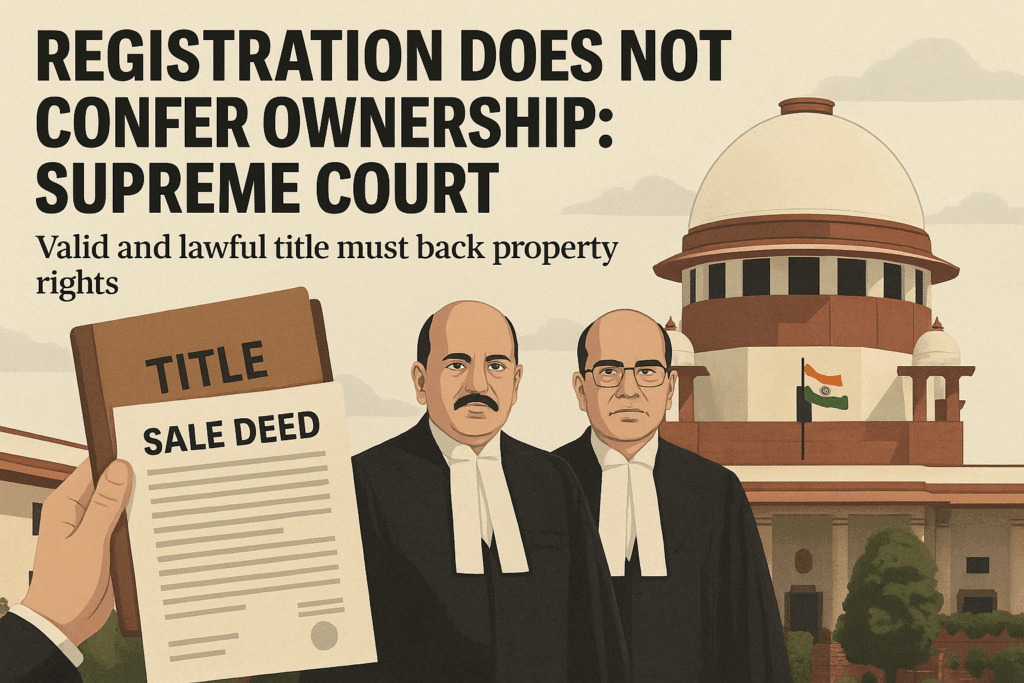🧭 Introduction
When you register a property, it’s easy to feel like you're the legal owner. But the Supreme Court of India recently issued a landmark ruling that changes everything: registration is only a procedural formality, not evidence of actual ownership .
For buyers, developers, and homeowners, this is a wake-up call—what truly matters is having a clear title, legal possession, and a strong paper trail of documents supporting ownership. This article will unpack the verdict, outline the essential documents for proving ownership, walk you through practical tips, and answer FAQ to ensure your dream home is truly yours.
🔍 1. Understanding the Top Court Verdict
In Mahnoor Fatima Imran & Ors v. Visweswara Infrastructure Pvt Ltd, the Supreme Court clarified:
-
Registration is procedural, not conclusive proof of ownership
-
Registrar's role is administrative; they don’t verify the legal title verdicto.news.
-
If the seller lacks a lawful title—even after registering the property—the transaction is legally void or voidable
-
Physical possession + defective title ≠ legal ownership
👉 Bottom line: Registration alone doesn’t transfer ownership. You need a valid, defect-free title from the source.
📝 2. Documents That Prove True Homeownership
Here's what stands between you and genuine ownership:
| Document | Why It Matters |
|---|---|
| Clear Title Deed or Sale-Deed Chain | Tracks ownership lineage for ~30 years; key to verifying vendor’s ownership |
| Possession Documents | Possession letter, handing-over note, possession certificate shift rights in your favor. Courts view physical control favorably. |
| Mutation Certificate | Updates tax & legal records. Not conclusive alone, but crucial for evidence. 🤝 |
| Encumbrance Certificate (EC) | Checks for mortgages, liens, dues over the past 30 years—essential for clean title. |
| Tax Receipts & Utility Bills | Helps prove you're the one using/maintaining the property. |
| Occupancy/Completion Certificate | Mandatory for apartments/homes; protects against illegal constructions . |
| Approved Plan & Zoning Permits | Verifies legal construction rights—RERA, layout permission, no encroachment zones. |
| Power of Attorney (if used) | Must be registered. Adds legal transparency. |
| No Dispute Certificates / Title Insurance | Optional but powerful safeguard—adds legal and financial layer of protection. |
📌 3. Case Examples & Real-World Impact
-
Mahnoor Fatima Imran Case (Telangana)
A 1982 unregistered sale agreement led to invalid title—even after subsequent registration -
Telangana 4‑month Rule on Sale-Deeds
Sale deeds must be registered within 4 months or risk invalidity—a procedural safeguard with legal consequences -
Property Market Reaction in Odisha
Stakeholders are now reopening past deals, due to registrations lacking occupancy certificates or layout approval
🛠️ 4. Practical Tips for Homebuyers & Owners
-
✅ Complete Title Chain Check: Hire a qualified lawyer to review past 30 years.
-
🔍 Verify EC & Mutation: Crucial to avoid surprise liens or owner conflicts.
-
🗺️ Inspect Government Permissions: Ensure occupancy certificate, RERA/completion certificate, zoning laws compliance.
-
🤝 Document Possession Transfer: Retain signed handover notes indicating date/terms of possession.
-
💼 Use Power of Attorney Carefully: Get it registered and legally vetted.
-
🛡️ Consider Title Insurance: Especially for high-value properties to mitigate future risks.
-
🧑⚖️ Court Support: If any prior title is contested, scheduling interim injunction can protect your claim.
✅ 5. Conclusion: What You Need to Do
-
Property registration is necessary but not sufficient.
-
Real ownership is built on a stack of documents, legal due diligence, and proper possession.
-
After the SC ruling, buyers must be more vigilant—don’t rely solely on registration. Use professionals, verify thoroughly, and safeguard your investment.
❓ FAQ (for SEO & Engagement)
1. Is a registered sale deed conclusive proof of ownership?
No—it only shows a registered transaction. Ownership depends on valid title and lawful transfer
2. What documents should I verify before buying a property?
Title chain, EC, mutation, tax receipts, possession papers, occup certificate, zoning permits—and consider title insurance.
3. Can registration be invalidated later?
Yes—if the seller lacked title, registration is voidable. Courts can cancel such registrations.
4. How long should title due diligence go?
Ideally 30 years. Helps detect liens, encumbrances, fraud.
5. What if I already bought a property and only have a registered deed?
Get a lawyer to review title chain, ECs, mutation records. Seek conflict resolution, and consider title insurance.
🎯 SEO Keywords: property registration not proof of ownership, proof of homeownership documents, Supreme Court property registration ruling, property title documents India, clear title property checklist.


